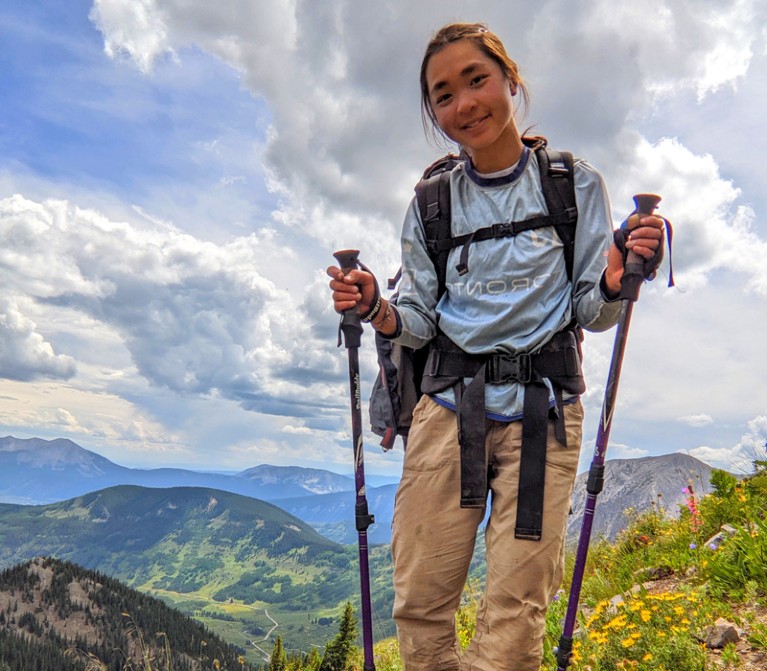
Lydia Wong studies wild bees and wasps in Colorado’s Rocky Mountains.Credit: Lydia Wong
Over the years, I’ve met numerous people who have admitted to experiencing social anxiety in some form. Often, their struggles are especially acute in academic environments, in which ‘flawless’ interactions with supervisors, colleagues, peers and interview panels are crucial to success.
I can relate to the experiences of these individuals on a personal level, because as a child I had selective mutism. Children with this social-anxiety disorder are unable to speak in some situations or around certain people, despite being perfectly capable of speech in other contexts. Left untreated, it often persists into adulthood.
While at school, I wouldn’t drink any water during the day to avoid having to ask to go to the bathroom. As an undergraduate, I got used to getting a zero when marks were awarded for participation, and I fretted over oral presentations for weeks beforehand.
Being involved in field research at university was what eventually helped me to overcome my mutism. I was so excited about the plants and insects I was working with that I could no longer keep quiet. Instead, I found myself talking freely with my teachers and fellow students about the flora and fauna we were seeing. Now, as an ecology graduate student, I love many aspects of research. I feel fortunate to have landed myself a position in a laboratory with a supportive supervisor, and to have had opportunities to conduct fieldwork in stunning landscapes.
Tricky situations
However, fieldwork is only one part of my life in research. There are so many situations in which social anxiety can surface — from conferences and interviews to lab meetings and social events. Although I no longer experience mutism, intense feelings of anxiety persist in these sorts of circumstance, and have shaped my life as a young academic. At times, my anxiety has left me feeling inadequate, misunderstood, isolated and uncertain about pursuing a career in academia. On the basis of conversations with other students, I don’t think my experiences are uncommon.

How burnout and imposter syndrome blight scientific careers
I find that people often misread my behaviour or demeanour because they are unaware of the ways in which social anxiety can manifest itself. Here are five examples:
1. I struggle with conversations that involve being face-to-face, especially in public venues, so having an informal discussion in a café or restaurant is difficult for me. But if you were to join me for a hike, or chat to me in a quiet meeting room, I’d find it much easier. I’ve also had fruitful scientific conversations while working in the lab and in the field, and even while washing dishes after an event.
2. Looking into people’s eyes can be unsettling for me, and when I try to do it, I have a hard time concentrating on what is actually being said. Please don’t interpret my lack of eye contact as disinterest or boredom. I might not be looking at you, but I am listening, engaged and empathetic.
3. If I’m silent, it doesn’t mean I’m being rude, unfriendly or judgemental. I know it can be difficult to get a sense of what I’m thinking if I’m quiet, but in some situations it’s hard for me to speak my thoughts. Ideas become jumbled in my mind, and by the time I’ve settled on how to communicate them, the conversation has moved on.
4. Anxiety isn’t ‘rational’, so I can’t reason my way out of it, or identify logical patterns that characterize it. My anxiety manifests itself intensely in some situations, but not at all in others, in seemingly inconsistent ways. For me, oral presentations are no longer a problem, but attending academic social events can be overwhelming.
5. I want to connect with people but, ironically, my anxiety often emerges when I’m in the company of people with whom I particularly want to have intellectual and meaningful discussions. I can happily strike up conversations with strangers and chat amicably with the public at outreach events, but become silent, awkward or avoidant when I’m with the people I most want to talk to. This is an isolating experience, and I hope that those who experience my difficulties in communicating will not take it personally.
Work in progress
As a doctoral student, I chip away at my thesis every day; I make research plans, seek out help if I need it, set goals and do my best to achieve them. I try to deal with my social anxiety in a similar way, and I recognize my own responsibilities in this journey. I also do my best to make sure my anxiety doesn’t interfere with or inconvenience those around me. I understand that, for many, cafés are wonderful places for scientific exchanges, and the last thing I want is for my condition to deter others from enjoying useful discussions over coffee.

Collection: Science careers and mental health
At the same time, I wonder whether we can work towards a middle ground as an academic community. In his 2017 book Academic Ableism: Disability and Higher Education, Jay Dolmage, a disability-rights activist based at the University of Waterloo in Canada, describes the notecard technique, whereby people attending seminars, lectures and conferences can submit questions or comments to speakers on paper or digitally. I love this idea. Putting a hand up in this setting can be daunting — my notebooks are regularly filled with unasked questions and unshared thoughts. Notecards give audience members a chance to ask questions in a non-verbal manner. The pandemic has led to the development of a wealth of tools that facilitate this, including Slido, Mentimeter, Vevox and even Zoom’s chat function.
Various other ideas, such as anonymous polling and small-group ice-breakers, have been proposed as ways to make university classrooms less anxiety-inducing1. As a teaching assistant, I’ve taken to encouraging reticent students in my tutorial and lab sessions to e-mail me if they have any questions or concerns.
I know that the experiences of people struggling with social anxiety in academia vary widely. Because of this, I doubt there is a single practical solution with which to address it. That said, my personal wish, above all, is for greater understanding and acceptance in the academic community. Those of us who falter in conversation, avoid social events and look at the ceiling when we speak tend not to give good first impressions. We might seem unfriendly and disengaged — perhaps even judgemental and haughty. I sincerely hope that what I’ve shared testifies otherwise.

